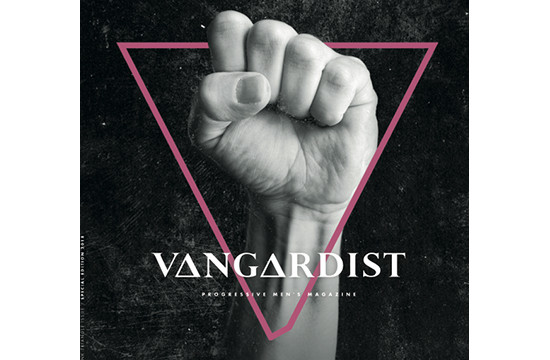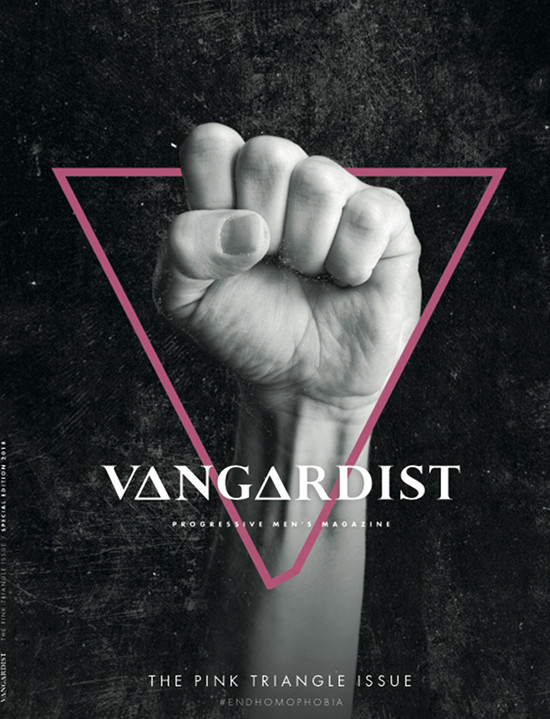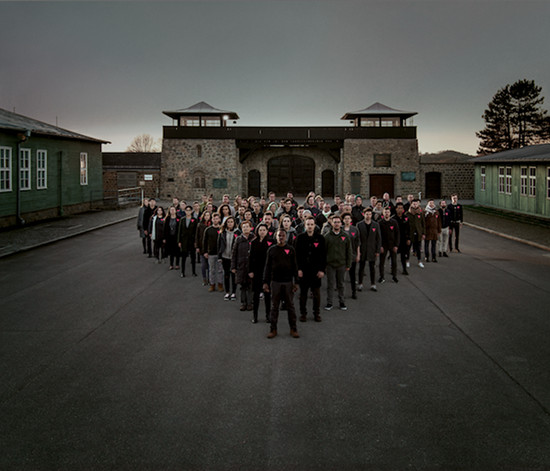
Your Shot: Vangardist’s Mission to Change the Universal Declaration of Human Rights

Three years ago Jason Romeyko - who was then the ECD of Saatchi & Saatchi Switzerland but is now worldwide ECD of the Serviceplan Group - and Vangardist, a German- / English-language men’s monthly magazine, printed an edition with ink infused with the HIV positive blood of three individuals living the virus. The project’s main aim was to end the social stigma surrounding HIV and widely successful, both within adland and common culture.
Vangardist and Jason - with his new agency Serviceplan - have teamed up again, this time highlighting the violations of LGBTQI+ rights around the world and encouraging the United Nations to change the Universal Declaration of Human Rights.
The campaign is made up of a number of aspects. Mauthausen Memorial, the memorial to the concentration camp of the same name in which the Nazis imprisoned homosexual men during World War Two and forced them to wear a pink triangle as a label, are involved. The central point of the campaign is a film shot here by PPM’s Christoph Kuschnik, which features Sudeene, a Jamaican victim of homophobic hate crime, along with 80 others from 10 countries. There’s also a Pink Triangle special edition of Vangardist to outline the campaign’s vision and an exhibition was unveiled on May 16th - the day before the International Day against Homophobia. All of this encourages people to head to a dedicated website where you can sign a petition which will be delivered to UN secretary general António Guterres, in the hope that he will push for a change to the Universal Declaration of Human Rights.
LBB’s Addison Capper spoke to Jason, Christoph and Vangardist editor Julian Wiehl to find out more.
LBB> Jason I know you’ve worked with Vangardist before but what were the foundations of this project?
JASON> Over the past years, the LGBTQI+ community has enjoyed a higher prominence in the media. Anderson Cooper, Ellen Degeneres, Troy Sivan, Neil Patrick Harris, George Takei, the list goes on. Through entertainment and social media on all kinds of screens, these people have brought positive stories about gays and lesbians to the masses.
In addition, topics like gay marriage and adoption dominate the media.
So the public perception in the western world is that homophobia is on the way out.
But the reality is quite the opposite.
But all of these positive stories are detracting from the growing number of horrific tragedies to lesbians, gays, bisexuals, transgenders and others all around the world.
And as no-one is talking about them, they can grow and go unpunished. Then one day they will appear in our own backyard again.
So together with Vangardist, we decided to raise the issue around the infringement on human rights and to make a difference.
LBB> Was it quite a collaborative effort between Serviceplan, Julian Wiehl and the team at Vangardist?
JASON> Very much so. Vangardist has a history of doing good things for different groups including refugees. Julian himself is a respected journalist with contacts to many different organisations around the world. Between Serviceplan and the magazine, it is a good match of qualities.
CHRISTOPH> Sure – but in a very positive and effective way. Everybody had the same goal: stop the world from looking away. This was a very motivating momentum.
JULIAN> We were involved from the very beginning. Jason Romeyko and I are not only business partners but also close friends. So he contacted me as soon as he had the idea for the Pink Triangle Issue. From then on we were involved in all the steps and decisions from Serviceplan and produced the VANGARDIST Pink Triangle Issue special edition with our team.
LBB> Julian, the HIV Heroes project that you and Jason worked on before was a huge success - why were you compelled to follow that up with this project?
JULIAN> I think there was a lot of trust because of the HIV+ issue. We like to work together and we know how to deal with difficult situations that always come up in such big campaigns. I guess we both believe that we can deliver what is needed to make a big campaign. So let’s hope for the best, that it will be a little of the success we had with the last project.

LBB> What inspired the approach that you’ve taken with this?
JULIAN> Personally I really wish everybody a life in peace and safety. When I hear about how people from the LGBTQI+ community are mistreated around the world it really breaks my heart. And as I live in a very liberal society I see it as my duty to raise my voice for those who can’t. If you can combine improving the life of others with your daily work it’s even better. So I think this is a win-win project for everybody and it would be a big failure if we would not take the chance to play our part in it.
LBB> The aim here is to encourage the UN’s secretary-general, António Guterres, to reform homophobic laws around the world. Where is this conversation and issue at right now and how has it evolved in recent times?
JULIAN> On the one hand the pressure of human rights groups, activists, the media and the public helped to improve the situation of the LGBTQI+ people a lot - especially in western countries where the current conversation is all about gay marriage and adoption by same-sex couples. On the other hand there are still 72 countries where same-sex love is punishable and 12 countries where the death penalty is part of the daily thread. So it is time for the world to help the people in these 84 countries and to end this daily nightmare that so many people are suffering from.
LBB> Jason and Christoph, what was the research process like for this? It must have been pretty gruelling.
JASON> I think the most heartbreaking part of this project is the information we found out about homophobia in over 70 countries. For example in some Central American countries lesbian women are put into dresses with bright red lipstick and raped by men as part of their rehabilitation. In India now homosexual sex can lead to life imprisonment. Even in Germany it is supposedly still legal to take a gay person to ‘sexual reprogramming’.
CHRISTOPH> It was and it is the most touching project I have ever been involved in. Everybody went to their limit. Hearing the unbearable stories of the past, watching the pictures and documents, and then understanding that people are still being persecuted for the same reasons and in an unbelievably cruel way was hard to take. But we all knew that we had to do it and so we somehow managed to get through the whole process. It helped a lot to have such a great team and always someone to talk to.
LBB> How did the relationship with Mauthausen Memorial come about? Was that link to them and the history of concentration camps always pivotal to the project?
CHRISTOPH> In fact it was the initial thought of Jason when I told him that we wanted to raise the issue. And yes – it was pivotal for the whole campaign that Mauthausen was committed from the first moment we started our conversation. In the beginning we never thought it would be possible to collaborate in the way we ended up doing. But when we first met Barbara Glück – the director of Mauthausen Memorial – it was clear we had found a dedicated partner and a great supporter.
LBB> It’s quite unusual for a concentration camp organisation to involve itself in a project like this - what do you think the difference was here?
CHRISTOPH> It is, indeed. To be honest, as far as I know not even Steven Spielberg was allowed to shoot on the premises of a former concentration camp. The difference here lies in the mission of Barbara Glück: she is very clear on her point of view on the felonies of the Nazi era. The purpose of Mauthausen as a former concentration camp is not only to be a memorial. Mauthausen reminds us that persecution, torture and murder is not something that happened in the past. We have to be aware of our present as we learned what people are able to do. And this is why she joined in – because it still happens.
JULIAN> I think we had great luck finding Dr. Barbara Glück, director of the Mauthausen Memorial. She immediately understood that combining past and present in a visual campaign like this is outlining the daily work of her and her team. The main reason that Mauthausen and all other memorials exist is not just to remind us about the dark history but more so to teach everybody that history is not going to repeat itself again. It is hard work to make a society aware that it’s not about the fact that we don’t want to forget this past. It’s about the fact that we don’t want it to become present again.

LBB> Sudeene, a Jamaican man that survived a gay purge in his home country, features in the campaign film. How did it come to be that he was the focus of the film?
CHRISTOPH> When we started to plan the film shoot, we asked Rainbow Railroad (the NGO based in Toronto) for survivors located in Germany or Austria. They helped us get in contact with Sudeene. In the beginning only our account director Anne was talking to Sudeene – we wanted to be very cautious. Then I had my first call with him to find out if he really would be willing to take part in the film shoot. We’d been talking for almost an hour and after this I was sitting there crying, but it was clear that we needed to tell his story.
LBB> The campaign film is pretty powerful but also really delicate in its approach - why was Christoph Kuschnik the right person to helm such a spot?
CHRISTOPH> Sebastian Larrosa-Lombardi, owner of the great film-company PPM, recommended Christoph. We started to talk about our ideas and intentions and very soon it was clear that we both wanted the same. It was a collaboration based on trust, and a great experience to have someone as sensitive and focused on that project as Christoph.
LBB> Who are the people that feature at the end of the film?
CHRISTOPH> The 80 people at the end of the film came from 10 different countries. They are of all ages, colours and sexual orientations, which was very important for me. I wanted to show that this is not a matter of a more-or-less ‘small’ community. It is something that concerns all of us because we are all as we are – and nobody should be punished for that. We asked them to stand up with us at Mauthausen (Jason Romeyko, Julian Wiehl, Barbara Gluck and I are also part of the group) as a symbol for the imprisoned people of the Nazi era.
LBB> What was the shoot like? Shooting in a place like that must have been very moving?
CHRISTOPH> Yes it was. It was very tense, very calm, very focused and moving. You could feel the weight of the past and then there was one moment where we had to stop shooting and take a break because it was too intense – because of the present. We set up this huge newspaper wall where you can see Sudeene standing and watching the headlines. You can’t see his face (and we would not want to show what happened at this moment in the barracks). He started crying all of a sudden. We immediately stopped and asked him what was happening. It turned out that one of the headlines was about a very close friend of his who was shot down and murdered.
LBB> There are quite a lot of angles to this campaign - the magazine, film, exhibition, etc. Could you outline them for us and how they all feed into each other?
CHRISTOPH> In the end one led to another. We started with the special issue of the Vangardist. Then we had Mauthausen as partner and it was clear that we needed to fulfil their historic claim – therefore we needed a very well documented exhibition as part of their museum. Then we had to find a way to collect participants and donations – so we started to create the website which contains the first visual petition worldwide. And then we needed something to make people aware of this urgent topic – the film. In the end everything leads to the website and hopefully to enough voices to break the silence.
LBB> Any parting thoughts?
CHRISTOPH> I hope we save at least one life. And I dream of a declaration of human rights that guarantees equality for all of us.
JASON> I agree with Christoph. This campaign is about saving lives. I hope we achieve our goal to amend the Human Rights Charter. That would be the legacy I would most hope to leave behind. For me personally as a gay man, for me and my friends, this is a matter of survival.
Find out more about how you can get involved here: https://pinktriangleissue.com













